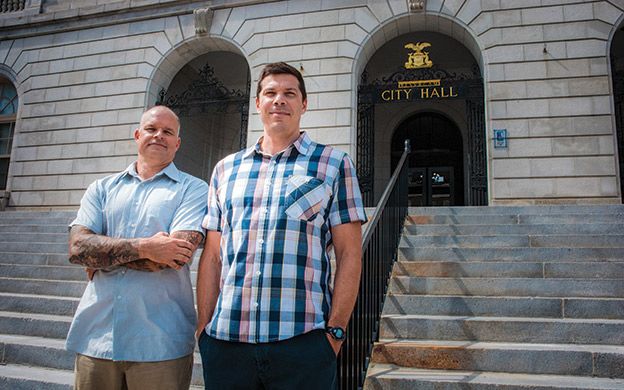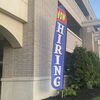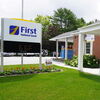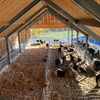On the record with John Rooks and Justin Jaffe, co-founders of Rapport
 Photo / James McCarthy
John Rooks (left), co-founder, president and CEO of Rapport, with Justin Jaffe, co-founder and COO, have just landed a contract with the City of Portland to track the environmental footprint of 50 municipal buildings.
Photo / James McCarthy
John Rooks (left), co-founder, president and CEO of Rapport, with Justin Jaffe, co-founder and COO, have just landed a contract with the City of Portland to track the environmental footprint of 50 municipal buildings.
Two years ago John Rooks and Justin Jaffe co-founded Rapport to help small- and medium-sized businesses and municipalities measure, track and reduce their environmental impact. Rooks, president and CEO, brings to the company 20 years' experience in the environmental and sustainability fields, including working internationally to help companies reduce their carbon footprints related to climate change. Jaffe, chief operating officer, previously worked for International Data Corp., an American market research, analysis and advisory firm.
They spent their first year doing market research, reaching out to prospective customers and building the software applications that are designed to automatically import data directly from utility accounts and use it to create customizable dashboards showing the business or municipal client's environmental footprint.
In October, Rapport won a $100,000 investment from AOL founder Steve Case's Revolution Growth during a “Rise of the Rest” pitch competition. “In terms of importance, I've been referring to it as the 'Big Bang' moment for Rapport,” says Jaffe. “It really brought a lot of interest to the forefront. It brought some other investors out of the woodwork and really provided the kick-start we needed to crystallize the business.”
Mainebiz caught up with Rooks and Jaffe in their office on the third floor of the State Theatre building to talk about the contract the company had just landed with the city of Portland to measure, monitor and report the environmental footprint for 50 city buildings. An edited transcript follows.
Mainbiz: What's your pitch? What is sustainability? How do you measure it? Why might that be useful?
John Rooks: The simplest way to think about it is that Rapport is like QuickBooks for environmental impact or sustainability. QuickBooks helps small- and medium-size businesses manage their financial health, while Rapport helps them manage their environmental health. Electricity is one example. If you can use less of it, that's good for your bottom line and it's good for the planet. Natural gas, water, solid waste disposal … all of those things are part of the environmental footprint of a business. The less of those resources you can use, the more of that money goes into your pocket and the less you damage the environment.
MB: How unique is it that Portland has signed on with Rapport to begin benchmarking its environmental footprint?
Justin Jaffe: It places Portland toward the front of the pack in demonstrating engagement with sustainability and taking it seriously. There are a handful of other cities and towns that have engaged in similar practices. It's the ones you would expect: New York City, San Francisco, Cambridge, Boston. So I think that Portland is punching above its weight class.
JR: Our philosophy has always been built on the concept of democratizing sustainability, bringing sustainability to the people who ordinarily couldn't afford it. We're targeting small- to mid-size business, municipalities and schools. With that as a market, there's plenty of growth ahead for us. There's only one New York City, one Atlanta, one San Francisco. But they all have bedroom communities that need to be paying attention to sustainability issues like Portland is.
MB: Businesses and municipalities don't do things simply to feel good about them. What might a client expect to see as the return on their investment?
JR: There's three bottom lines: People, the planet and profit. And we need to be hitting on all three of those. If we think about Baxter Brewing, based on the platform and seeing where their impacts were, they've been able to go from one dumpster pickup per week to one a month. So that's an immediate return on their investment. For the city, the first return they're going to see is a much lower administrative burden to manage this data. There's a cost savings immediately in efficiency, right there.
Read more
Startups announced for AOL's Steve Case pitch competition in Portland
Portland sustainability startup wins $100,000 investment in pitch competition










Comments